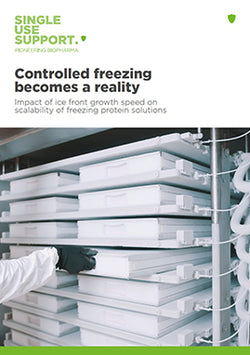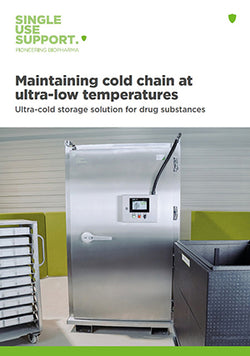Biologic Manufacturing: Process, Steps, and Challenges
Biologic manufacturing describes the process of producing medicine by the means of living organisms. Biotech and pharma companies make use of this approach to produce biologics like mAbs (monoclonal antibodies) or mRNA vaccines both at small and large scale, bringing several advantages over traditional small-molecule drug products.
Central practices in biomanufacturing encompass various stages of production, from upstream processes involving cell culturing and harvesting to downstream processes focusing on purification and formulation. In this article, we will take a look at the most distinctive steps and challenges, and discover how they can be mastered.
How to optimize efficiency in biomanufacturing
Pharmaceuticals produced via biomanufacturing
Biomanufacturing plays a crucial role in the production of various pharmaceuticals, particularly biologics and biosimilars. This process involves harnessing living cells, microbes, or genetically engineered systems to produce a wide range of healthcare bioproducts.
Some common types of biomanufactured products include[[1]] [[2]]:
- Vaccines (e.g. mRNA vaccines)
- Viral vectors
- Blood products
- Cell and gene therapies
- Antibodies (e.g. monoclonal antibodies)
- Recombinant proteins
- Growth factors
- Hormones
- Gene therapies
Manufacturing biologics - step by step
Manufacturing biologics involves a series of distinct process steps, each crucial in ensuring the production of high-quality biopharmaceuticals. These steps encompass various processes, from initial cell line development to final product formulation and distribution.
Throughout the manufacturing process of biologics, stringent quality control measures and adherence to regulatory standards are paramount to ensure the safety and efficacy of the biologic drugs. Let's dive a bit deeper!
Biologics upstream processes: Cell line development and culturing
In the initial stages of biologics manufacturing, upstream processes such as cell line development and culturing (e.g. in bioreactors) set the foundation for producing therapeutic proteins. These processes involve utilizing techniques like genetic engineering, microbial fermentation, and cell culture to establish cell lines capable of expressing the desired biologic drugs. Researchers may employ genetic engineering to modify the genome of host cells, optimizing them for protein production.

Mammalian cell lines are often preferred for their ability to produce complex proteins with human-like post-translational modifications. These cell lines are maintained in cell banks, ensuring their long-term viability and reproducibility throughout the manufacturing process.
Upstream processing also includes extensive process development and optimization to maximize protein yield, purity, and quality, e.g. via seed train intensification, where the cultivation process of a certain cell line can be increased in speed. Successful upstream processing lays the groundwork for downstream processing.
Downstream processing in the production of biologics
Downstream processing is a crucial phase in biologics manufacturing, where harvested proteins undergo purification, formulation, and final product manufacturing. This stage ensures the production of high-quality biopharmaceuticals ready for drug development and therapy.
Purification
During downstream processing, biotechnological techniques are employed to purify the drug substance, removing impurities and contaminants to meet stringent quality standards. This phase is particularly important for manufacturing biosimilars and biopharmaceuticals, with purity and consistency of the final product being paramount.
Techniques involved in this process include chromatography, filtration, and centrifugation, among others, allowing for the separation and purification of target proteins from cell culture supernatants.
Formulation
Formulation involves composing the final product with excipients to enhance its stability, solubility, and shelf-life. Buffer systems, crucial for maintaining pH within optimal ranges, are selected based on the biologic molecule's properties.
Stabilizers may be incorporated to shield the drug substance from degradation due to various factors like temperature and oxidation. These additives safeguard the structural integrity of the biologic, preventing denaturation.
Filling of biologics
Filling processes are to be encountered in several upstream and downstream phases of biomanufacturing, when either intermediates or finished biopharmaceuticals are transferred (e.g. into bioprocess containers). Additionally, further substances, such as buffer solutions and media, may be added. These processes demand close attention to filling precision and sterility in order to minimize the risk of batch-to-batch inconsistencies and product loss.
Throughout the manufacturing process, stringent quality control measures are implemented, and validation protocols are followed to monitor each step of production. Aseptic techniques are employed to maintain sterility during every step.
Fluid management solutions for biologics, such as Single Use Support’s RoSS.FILL, are developed to cater to these specific requirements, able to perform efficient fluid transfer while providing highest accuracy.

Freezing of biologics
Freezing biologics ensures the preservation of product integrity and efficacy. Biologics, such as monoclonal antibodies and other proteins, are often sensitive to temperature, making it necessary to follow individual freezing protocols for different product classes.
Freezing involves cooling biologics to sub-zero temperatures using controlled freezing methods to regulate the formation of ice crystals, which can damage protein structures. Cryoprotectants are added to the formulation to protect biologics from freeze-induced damage and ensure their stability during storage.
An increasingly popular approach in freezing biosimilars and biologics is plate freezing. The drug substances, filled in primary packaging options like single-use bioprocess containers, are covered by secondary packaging solutions, such as Single Use Support’s RoSS® Shell. These will have direct contact with the cooling plates of RoSS.pFTU or another plate freezer, leading to efficient heat transfer and maximum control over freezing rates.
Storage and cold chain logistics of biologics
Once frozen, storage of biologics requires specialized ultra-low temperature storage freezers to maintain protein stability over extended periods. These storage facilities are equipped with temperature monitoring systems to ensure that biologics remain within specified temperature ranges.
One of the most crucial strengths of ULT storage freezers like Single Use Support’s RoSS.ULTF is their high storage density thanks to a modular interior shelving system. Furthermore, as temperature variations and fluctuations may be detrimental to product efficiency and safety, these devices provide stable temperatures via reliable air temperature conformity, offering safe storage space for valuable biopharmaceuticals.
[[download-2-email-detailed]]
Challenges in biomanufacturing
Challenges in manufacturing biosimilars and biologics span worker safety, product integrity, and scalability. These challenges for the biotechnology industry are tied to regulatory compliance, the complexity of the manufacturing process, and evolving possibilities and demands in biotechnology.
- Product safety: Maintaining the safety, efficacy and integrity of biologic drugs throughout the manufacturing process is critical. Challenges arise in establishing proper freeze thaw processes for biosimilars and biologics, minimizing contamination risks, and reducing other risks associated with product loss.
- Regulatory compliance: Biomanufacturing is subject to rigorous regulatory oversight from agencies. Compliance with regulations governing manufacturing processes, quality control measures, and Good Manufacturing Practices (GMP) is vital to ensure the safety of new drugs, therapies, and vaccines – in preclinical and clinical trials as well as in the commercial manufacturing of biologics.
- Worker safety: Ensuring the safety of workers engaged in biomanufacturing processes is unnegotiable. Risks such as exposure to hazardous materials, ergonomic strains, and potential accidents during manual handling or when working in ATEX zones (explosive atmosphere) must be addressed through comprehensive safety protocols and ongoing training initiatives.
- Quality control: Implementing robust quality control measures throughout the manufacturing process aid in delivering safe and effective biologic drugs. While regulatory standards are the baseline when designing pharmaceutical manufacturing processes, establishing specific measures to monitor CQAs (critical quality attributes) depends on individual biomanufacturing environments. Here, traceability, standardization, and transparency are key to establish process control and quality systems.
- Scalability: Scale-up of biomanufacturing processes to meet increasing demand while maintaining product quality presents significant challenges. Balancing scalability with process efficiency, resource allocation, and cost-effectiveness requires careful planning and investment in infrastructure and technology.
In order to face these challenges, manufacturers are increasingly focusing on implementing technologies based on single-use technologies. Coupled with automated workflows, these are able to increase both reliability and cost-effectiveness.
Efficiency in manufacturing biologics is becoming even more crucial
The biopharmaceutical industry is facing increased pressure to enhance efficiency due to several factors. A rising global demand for biopharmaceutical products, driven by medical advances and the prevalence of chronic diseases, is creating a need for more efficient production. Global health challenges, such as pandemics, also highlight the importance of agile manufacturing processes.
Regulatory bodies are pushing for greater efficiency, with ambitious goals to reduce the cost of therapies and increase access. In this competitive landscape, optimizing resources and minimizing waste are crucial for companies to stay ahead. [[3]] [[4]]

Achieving efficiency in biologic manufacturing involves a multi-faceted approach, focusing on four key areas:
- Sustainable use of natural resources: In biomanufacturing, water, energy, and raw materials are crucial resources used throughout various stages of production. Implementing strategies to minimize consumption, recycle where possible, and adopt sustainable alternatives is key to efficient resource utilization.
- Time efficiency: Time is critical for patients' access to potentially life-saving treatments and therapies. Every step of the production process, from cell culturing to product formulation, requires careful optimization to minimize time-to-market. Delays at any stage can prolong the development and production timeline, and may result in extended wait times for patients in need. Moreover, swift production and distribution of biopharmaceuticals are crucial during public health emergencies, such as pandemics or disease outbreaks.
-
Cost efficiency: Optimizing production processes for maximum yield and productivity is essential for financial sustainability. This involves streamlining manufacturing workflows, reducing cycle times, and minimizing downtime through predictive maintenance and automation technologies.
- Efficient allocation of human resources: The thorough allocation of human resources is particularly integral in light of the challenges associated with manual handling. Trained personnel are essential for ensuring the quality and safety of biopharmaceutical production processes. With skilled labor becoming scarce, it's crucial to optimize the workforce. By automating repetitive tasks, companies can free up trained personnel to focus on more complex, value-added activities. Automation also reduces the risk of human error and contamination, enhancing safety and cGMP compliance.
More than a trend: Efficiency gains with single-use technologies
Single-use technologies are revolutionizing biomanufacturing by offering significant efficiency gains across various aspects of production. These technologies encompass a wide range of disposable equipment and systems, including bioreactors, filtration units, and tubing assemblies, which are used once and then discarded.
One key advantage of single-use technologies is their ability to streamline production processes by eliminating the need for cleaning and sterilization of durable stainless-steel installations between batches. This minimizes downtime and staff requirements. Additionally, single-use technologies minimize the risk of cross-contamination and product carryover.
Coupled with automation technology, single-use solutions can not only reduce water and energy consumption, but also increase manufacturing flexibility and accelerate time-to-market for biopharmaceutical products.

Merging efficiency with quality standards: Process solutions by Single Use Support
Both efficiency and product quality are unnegotiable. Single Use Support offers a range of cutting-edge process solutions tailored to meet specific demands in biomanufacturing. By replacing traditional stainless steel systems with disposable components, biopharmaceutical manufacturers mitigate the risk of cross-contamination and ensure product integrity. Furthermore, automated systems reduce the need for manual handling and thus the risk of human error.
Single-use solutions as provided by Single Use Support offer enhanced flexibility and enable scalability, allowing for rapid process development and easy scale-up. This is facilitated by the modular design of Single Use Support’s product portfolio – be it RoSS.FILL as a fluid management solution for biosimilars and biologics with its elevated efficiency and filling precision, or the plate freezing platform RoSS.pFTU.
RoSS.pFTU is able to freeze and thaw different volumes of drug substances – from a few mL to hundreds of liters –, able to meet individual freezing rates and protocols while reaching temperatures as low as -80°C. RoSS.LN2F provides equal control over freezing rates. However, this cryogenic freezer is designed for even lower temperatures (down to -170°C) without direct exposure to liquid nitrogen.
All these systems streamline operations, reduce downtime and enhance overall productivity. And as the biopharmaceutical industry continues to evolve, embracing single-use technologies enables drug manufacturing facilities to meet a growing demand while maintaining the highest standards of safety and quality.
- Biologics vs. small molecules: Drug costs and patient access, http://dx.doi.org/10.1016/j.medidd.2020.100075, Published 2020-11-23
- Biomanufacturing and Synthetic Biology, https://www.cdc.gov/niosh/topics/advancedmnf/biomnf.html, Published 07.2019
- The Burden of Chronic Disease, http://dx.doi.org/10.1016/j.mayocpiqo.2023.08.005, Published 2024-01-21
- Bold Goals for U.S. Biotechnology and Biomanufacturing, https://www.whitehouse.gov/wp-content/uploads/2023/03/Bold-Goals-for-U.S.-Biotechnology-and-Biomanufacturing-Harnessing-Research-and-Development-To-Further-Societal-Goals-FINAL.pdf, Published 03.2023

Download whitepaper
Whitepaper: RoSS.pFTU - Controlled scalable freezing
As one of the most essential parameters in terms of achieving control over freezing & thawing bulk, the freezing rate has been considered and evaluated in different tests. Using the ice front growth speed as a leverage had a significant impact on controllability and, as a result, on protein quality.

Download whitepaper
Whitepaper: RoSS.ULTF - Maintaining cold chain at ultra-low temperatures
This whitepaper explores how RoSS.ULTF bridges the gap between conventional lab freezers and walk-in cold rooms. Designed for -80°C storage, RoSS.ULTF ensures reliable temperature uniformity, modular scalability, and high storage density for single-use bags and bottles. Learn how this ultra-low temperature solution supports biopharma manufacturers in preserving product integrity across the cold chain.
